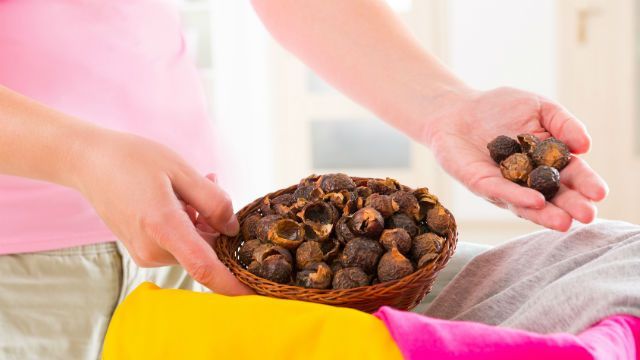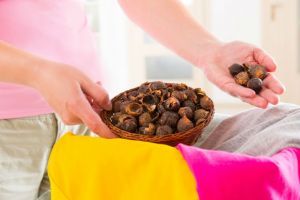
While traditional laundry soap may make your clothes smell fresh and clean, those conventional products often contain toxic chemicals with a wide range of negative effects, including everything from skin irritation to carcinogenicity.
Researchers from the University of Washington found that dryer vents can emit over 25 volatile organic compounds when scented laundry soap and dryer sheets are used, including seven that are classified as hazardous air pollutants.
Soap nuts, sometimes referred to as soap berries, are an all natural alternative to potentially harmful laundry detergents. This berry-like fruit grows on the Sapindus Mukorossi tree, native to India and the Himalayas.
The berries produce a substance called saponin, which operates as a natural surfactant. The soap nut shell absorbs water and releases the saponins, which circulate in wash water, freeing dirt, grime and oils from clothing.
Soap nuts can also be used to clean dishes, as a shampoo to wash your hair, or for surface cleaning. They’re 100 percent natural and biodegradable and don’t contain any pesticides, as insects are naturally repulsed by saponin, so there is no need to use them in cultivation. They are completely safe for septic systems, gentle for use on sensitive skin, including baby clothes, and are also antimicrobial.
To use them as a laundry soap, place 5 to 6 soap nuts in a muslin bag – buy one, make your own out of fabric scraps, or just use a sock. You can wash in any temperature, although higher temperatures tend to be more effective as the heat aids in releasing the saponins.
After washing, remove the bag or sock and allow it to dry. The berries within the bag can be used several times, until the shells become soft and grey. Test them by squeezing when wet. If you can squeeze out a foamy, honey-like liquid, they can be used again. It’s best to use new soap nuts for heavy and/or especially dirty loads.
Just like laundry detergent and many other cleaning and personal care products, dishwashing soap has been found to contain numerous toxic chemicals; in fact, liquid dish soap is said to be the leading cause of poisonings in the home for children under the age of 6.
To use soap nuts as an alternative to standard dish soap, boil them in water for about 10 minutes to create a thin liquid. The general formula calls for about 12 soap nuts boiled in a half-liter of water. Adding a few drops of lemon essential oil is optional to provide a fresh, pleasant scent. Along with washing your dishes, you can use this liquid to clean countertops and other surfaces.
A 2013 study found cancer-causing chemicals in 98 shampoos, soaps and other personal care products sold across the nation by major retailers. One of the most common was cocamide DEA (cocamide diethanolamine), which is a chemically-modified form of coconut oil used as a thickener or foaming agent, listed by the state of California as a known carcinogen in 2012.
If you’ve tried natural shampoo alternatives and haven’t found any that work for you, you might consider trying soap nuts. This simple recipe helps to clean and nourish the hair without toxic chemicals: Boil 5 soap nuts in a small muslin bag placed in 2 cups boiling water. Reduce heat and simmer for about 20 minutes.
 Add one more cup of water, and optionally, 5 drops of lavender essential oil. Simmer for an additional 10 minutes; remove from heat. Squeeze out the bag until it begins to produce a foamy liquid; rinse with cool water and squeeze it into the pan again.
Add one more cup of water, and optionally, 5 drops of lavender essential oil. Simmer for an additional 10 minutes; remove from heat. Squeeze out the bag until it begins to produce a foamy liquid; rinse with cool water and squeeze it into the pan again.
To use, allow mixture to cool, then massage a small amount into your hair and allow it to sit for 5 minutes. Rinse well. The shampoo can be stored in a glass jar in the refrigerator until you’re ready to use it again.
While it might take just a little more time to make your own, the reward of better health – and a healthier environment – is well worth the small effort.
-The Alternative Daily

